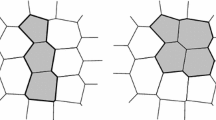Abstract
In this paper, we analyze the convergence of the adaptive conforming P 1 element method with the red-green refinement. Since the mesh after refining is not nested into the one before, the Galerkin-orthogonality does not hold for this case. To overcome such a difficulty, we prove some quasiorthogonality instead under some mild condition on the initial mesh (Condition A). Consequently, we show convergence of the adaptive method by establishing the reduction of some total error. To weaken the condition on the initial mesh, we propose a modified red-green refinement and prove the convergence of the associated adaptive method under a much weaker condition on the initial mesh (Condition B).
Similar content being viewed by others
References
Ainsworth M, Oden J T. A Posteriori Error Estimation in Finite Element Analysis. New York: John Wiley Sons, 2000
Babuska I, Rheinboldt W C. Error estimates for adaptive finite element computations. SIAM J Numer Anal, 1978, 15: 736–754
Bank R E. The efficient implementation of local mesh refinement algorithms. In: Babuska I, Chandra J, Flaherty J E, eds. Adaptive Computational Methods For Partial Differential Equations. Philadelphia: SIAM, 1983
Bank R E. PLTMG: A Software Package for Solving Elliptic Partial Differential Equations: User’s Guide 6.0. Philadelphia: SIAM, 1990
Bank R E, Sherman A H, Weiser A. Refinement algorithms and data structures for regular local mesh refinement. In: Stepleman R S et al. eds. Scientific Computing. Amsterdam: North-Holland, 1983, 3–17
Becker R, Mao S. An optimally convergent adaptive mixed finite element method. Numer Math, 2008, 111: 35–54
Brenner S C; Scott L R. The Mathematical Theory of Finite Element Methods, 2nd ed. New York: Springer Verlag, 2002
Carstensen C, Hoppe R H W. Convergence analysis of an adaptive nonconforming finite element methods. Numer Math, 2006, 103: 251–266
Carstensen C, Hoppe R H W. Error reduction and convergence for an adaptive mixed finite element method. Math Comp, 2006, 75: 1033–1042
Cascon J M, Kreuzer Ch, Nochetto R H, et al. Quasi-optimal convergence rate for an adaptive finite element method. SIAM J Numer Anal, 2008, 46: 2524–2550
Cervenka J. URL: http://www.iue.tuwien.ac.at/phd/cervenka/node14.html
Chen L, Holst M J, Xu J C. Convergence and optimality of adaptive mixed finite element methods. Math Comp, 2009, 78: 35–53
Dörfler W. A convergent adaptive algorithm for Poisson’s equation. SIAM J Numer Anal, 1996, 33: 1106–1124
Fleischmann P. URL: http://www.iue.tuwien.ac.at/phd/fleischmann/node23.html
Hu J, Shi Z C, Xu J C. The convergence of the adaptive Morley-type elements. Numer Math, 2009, 112: 25–40
Hu J, Xu J C. Convergence of adaptive conforming and nonconforming finite methods for the perturbed stokes equation. Research Report. Peking University, Beijing, 2007
Leitner E, Selberherr S. Three-dimensional grid adaptation using a mixed-element decomposition method Simulation of Semiconductor Devices and Processes. Wien, Austria. Springer, 1995, 464–467
Molino N, Bridson R, Teran J, et al. A crystalline, red green strategy for meshing highly deformable objects with tetrahedra. In: Proceedings of the 12th International Meshing Roundtable. Samta Fe, NM: Sandia National Laboratories, 2003, 103–114
Morin P, Nochetto R H, Siebert K G. Data oscillation and convergence of adaptive FEM. SIAM J Numer Anal, 2000, 38: 466–488
Morin P, Nochetto R H, Siebert K G. Convergence of adaptive finite element methods. SIAM Rev, 2002, 44: 631–658
Taakili A, Becker R. URL: http://web.univ-pau.fr/~becker/ConchaBase/ConchaBasePool/RedGreen/
Verfürth R. A Review of A Posteriori Error Estimation and Adaptive Mesh-Refinement Techniques. Chichester: Wiley-Teubner, 1996
Author information
Authors and Affiliations
Corresponding author
Rights and permissions
About this article
Cite this article
Zhao, X., Hu, J. & Shi, Z. Convergence analysis of the adaptive finite element method with the red-green refinement. Sci. China Math. 53, 499–512 (2010). https://doi.org/10.1007/s11425-009-0200-x
Received:
Accepted:
Published:
Issue Date:
DOI: https://doi.org/10.1007/s11425-009-0200-x



